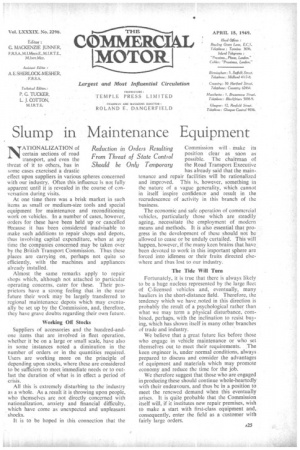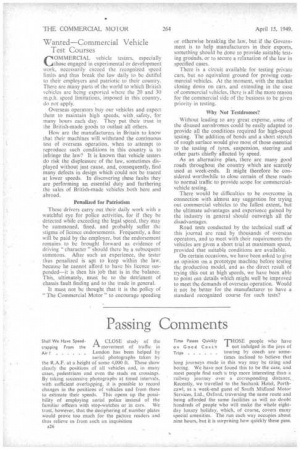Slump in Maintenance Equipment
Page 1

Page 2

If you've noticed an error in this article please click here to report it so we can fix it.
NATIONALIZATION of certain sections of road transport, and even the threat of it to others, has in some eases exercised a drastic effect upon suppliers in various spheres concerned with our industry. Often this influence is not fully apparent until it is revealed in the course of conversation during visits.
At one time there was a brisk market in such items as small or medium-size tools and special equipment for maintenance and reconditioning work on vehicles. In a number of cases, however, orders for these have been held up or cancelled Ifecause it has been considered inadvisable to make such additions to repair shops and depots, thus involving capital expenditure, when at any time the companies concerned may be taken over by the British Transport Commission. •Thus these places are carrying on, perhaps not quite so efficiently, with the machines and appliances already installed.
Almost the same remarks apply to repair shops which, although not attached to particular operating concerns, cater for these. Their proprietors have a strong feeling that in the near future their work may be largely transferred to regional maintenance depots which may eventually be set up by the Commission, and, therefore, they have grave doubts regarding their own future.
Working Off Stocks Suppliers of accessories and the hundred-andone items that are involved in fleet operation, whether it be on a large or small scale, have also in some instances noted a diminution in the number of orders or in the quantities required. Users are working more on the principle of depending upon stocks, where these are considered to be sufficient to meet immediate needs or to outlast the duration of what is in effect a period of crisis.
All this is extremely disturbing to the industry as a whole. As a result it is throwing upon people, who themselves are not directly concerned with nationalization, anxiety and financial difficulty, which have come as unexpected and unpleasant shocks.
It is to be hoped in this connection that the Commission will Make its position clear as soon as possible. The chairman of the Road Transport Executive has already said that the maintenance and repair facilities will be rationalized and improved. This is, however, something in the nature of a vague generality, Which cannot in itself inspire confidence and result in the recrudescence of activity in this branch of the business.
The economic and safe operatiOn of commercial vehicles, particularly those which are steadily ageing, necessitate the employment of modern means and methods. It is also essential that pro-, gress in the development of these should not be allowed to cease or be unduly curtailed. This will happen, however, if the many keen brains that have been devoted to work in this important sphere are forced into idleness or their fruits directed elsewhere and thus lost to our industry.
The Tide Will Turn Fortunately, it is true that there is always likely to be a huge nucleus represented by the large fleet of C-licensed vehicles and, eventually, many hauliers in the short-distance field. Therefore, the tendency which we havemoted in this direction is probably the result of a psychological rather than what we may term a physical disturbance, cornbined, perhaps, with the inclination to resist buying, which has shown itself in many other branches of trade and industry.
We believe that a great future lies before those who engage in vehicle maintenance or who set themselves out to meet their requirements. ,The keen engineer is, under normal conditions, always prepared to discuss and consider the advantages of equipment and materials which may promote economy and reduce the time for the job.
We therefore suggest that those who are engaged in producing these should continue whole-heartediy with their endeavours, and thus be in a position to meet the renewed demand when this eventually arises. It is quite probable that the Commission itself will, if it institutes new repair premises, wish to make a start with first-class equipment and, consequently, enter the field as a customer with fairly large orders. A25
Wanted—Commercial Vehicle Test Courses
ComMERCIAL vehicle testers, especially those engaged in experimental or development work, necessarily exceed the recognized speed limits and thus break the law daily to be dutiful to their employers and patriotic to their country. There are Many parts of the world to which British vehicles are being exported where the 20 and 30 m.p.h. speed limitations, imposed in this country, do not apply.
Overseas operators buy our vehicles and expect them to maintain high speeds, with safety, for many hours each day. They put their trust in the British-made goods to outlast all others.
How are the manufacturers in Britain to know that their machines will withstand the continuous test of overseas operation, when to attempt to reproduce such conditions in this country is to infringe the law? It is known that vehicle testers do risk the displeasure of the law, sometimes displayed without just cause, and, consequently, find many defects in design which could not be traced at lower speeds. In discovering these faults they are performing an essential duty and furthering the sales of British-made vehicles ,both here and abroad.
Penalized for Patriotism These drivers carry out their daily work with a watchful eye for police activities, for if they be detected while exceeding the legal speed, they may be summoned, fined, and probably suffer the stigma of licence endorsements. Frequently, a fine• will be paid by the employer, but the endorsement remains to be brought forward as evidence of driving " character " should there be a subsequent summons. After such an experience, the tester thus penalized is apt to keep within the law, because he cannot afford to have his licence suspended—it is then his job that is in the balance. This, ultimately, must be to the detriment of chassis fault finding and to the trade in general.
It must not be thought that it is the policy of "The Commercial Motor" to encourage speeding or otherwise breaking the law, but if the Government is to hap manufacturers in their exports, something should be done to provide suitable testing grounds, or to secure a relaxation of the law in specified cases.
There is a circuit available for testing private cars, but no equivalent ground for proving commercial vehicles. At the moment, with the market closing down on cars, and extending in the case of commercial vehicles, there is ail the more reason for the commercial side of the business to be given priority in testing.
Why Not Testdromes?
Without leading to any great expense, some of the disused aerodromes could be easily adapted to . provide all the conditions required for high-speed testing. The addition of bends and a short stretch of rough surface would give most of those essential to the testing of tyres, suspension, steering and other parts chiefly affected by speed.
As an alternative plan, there are many good roads throughout the country which are scarcely used at week-ends. It might therefore be considered worthwhile to close certain of these roads to normal traffic to provide scope for commercialvehicle testing.
There would be difficulties to be overcome in connection with almost any suggestion for trying out commercial vehicles to the fullest extent, but the ultimate advantages and experience gained by the industry in general .should outweigh all the disadvantages.
Road tests conducted by the technical staff of this journal are read by thousands of overseas operators, and to meet with their requirements the vehicles are given a short trial at maximum speed, provided that suitable conditions are available.
On certain occasions, we have been asked to give an opinion on a prototype machine before testing the production model, and as the direct result of trying this out at high speeds, we have been able to point out details which might well be improved to meet the demands of overseas operation. Would it not be better for the Manufacturer to have a standard recognized course -for such tests?


























